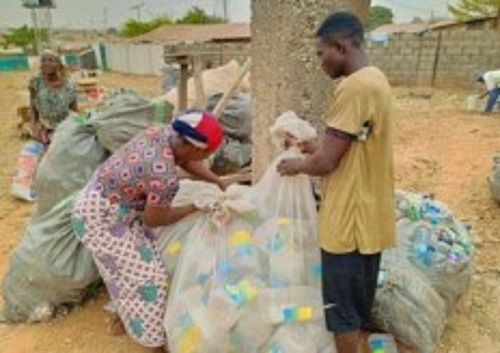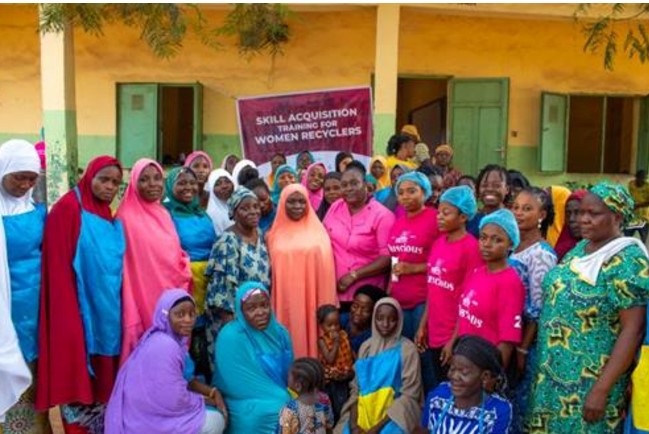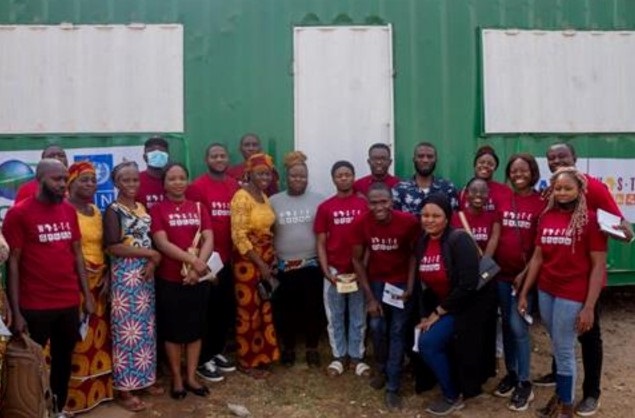According to a 2020 report by the Global Alliance for Incinerator Alternatives (GAIA), Nigeria was identified as one of the 20 largest contributors to plastic pollution in the world’s oceans, with the country’s coastal regions and rivers, such as the Niger and Benue Rivers, serving as major conduits for plastic waste, which eventually ends up in the ocean. In this report, EnviroNews writes on the “Reducing Marine Plastic Pollution through Recycling” project, a community-driven campaign aimed at mitigating waterways contamination in Nigeria

Plastic pollution has become one of the most significant environmental challenges in the modern world. The advent of plastics in the mid-20th century transformed human activities and revolutionised industries by offering versatile, durable, and inexpensive materials. However, these benefits come with a negative cost, as the poor practices have led to widespread environmental concerns, particularly in the maritime environment. Approximately, it is estimated that over 8 million tonnes of plastic enter the world’s oceans every year, a figure that is expected to increase if current trends continue.
In Nigeria, rapid urban growth continues to increase the demand for the generation and consumption of plastics. This developing trend, because it was not anticipated nor properly planned for, has sparked up new ecological conversations, with several Nigerians worried about its implications for many cities and communities across the country that lack access to proper waste collection and disposal systems. They are also anxious about how this menace is going to be curtailed in the face of the nation’s insufficient waste management facilities.
How to address these issues, including the lack of awareness on plastics and the general public’s reckless behavioural approach towards sustainable practices, are some of the questions that must be answered to curb this environmental threat from further polluting the country’s waterways.
Significance of the programme
The attempt to respond and provide practical answers to the aforementioned concerns inspired the Initiative for the Advancement of Waste Management in Africa (WASTE Africa) to conceptualise this noble programme, which began in 2023 with the mandate of reducing marine plastic pollution in the Wupa and Usuma Rivers in the Lugbe and Gwagwalada parts of Abuja, Nigeria’s capital.
The projected is sponsored by the Global Environment Facility (GEF) Small Grants Programme (SGP) and implemented by the United Nations Development Programme (UNDP).
While policies and technological solutions are essential to tackling marine pollution, adopting a community-led approach can play a pivotal role in effectively addressing this problem, as it promotes local action, collective responsibility, and the involvement of people who are directly impacted by or have a stake in the health of their environment.

Key approaches and activities
Various approaches were adopted and activities carried out to guarantee the delivery of the project mandate. One of such exercises conducted is the several engagement and focused group discussions with regulatory authorities, local leaders, women, and young people to build relationships with members of the various host communities and help to identify them for empowerment programmes.
“A major goal of this project is the empowerment of women and youths with self-paced employment…,” a brief on the project report reads.
Embarking on such a life-changing exercise led to the establishment of two solar-powered recycling hubs for the residents of the communities to go and exchange their recovered materials for cash. Capacity building and awareness creation programmes for women and youths on plastic issues, recycling processes, as well as waste-to-wealth opportunities were other strategies introduced to help mobilise and create employment for these communities.
Impacts and achievements
Over 48,848 kg (48.8 tonnes) of plastic waste materials have since been recovered by numerous recyclers in the project-focused axis, with feedback from the beneficiaries who testified that the project has elevated the impact and environmental outlook of their surroundings.
A total of 645 women from 10 communities were registered and onboarded as recyclers, with 460 of them actively participating in the programme. So, far, this effort has generated N4,221,540 million (four million, two hundred and twenty-one thousand, five hundred and forty naira) for the women recyclers and created jobs for four youngsters who have been employed to oversee the operations of the recycling hubs. Additionally, over 100 women received skill acquisition training to learn skills that require minimal capital to set up a business.

Lessons, challenges, and way forward
From the conceptualisation to the execution process, there is no doubt that this eco-driven program has contributed to the sustainability of the nation’s waterways and overall biodiversity protection. Truth be told, however, there are lessons on some of the obstacles that were faced during the enforcement period of the project that are worthy of note.
The inconsistencies in community participation, the low market value of plastic waste, and the poor communication mechanisms from cluster leaders regarding payment delays and pick-up scheduling are key findings from this venture that must be investigated immediately to urgently enhance Nigeria’s waste management systems, introduce stricter policies on plastic usage, and raise greater public awareness of environmental sustainability.
Thus, WASTE Africa’s approach to marine pollution is crucial since it draws on local expertise, encourages behaviour change, strengthens communities, and produces long-lasting solutions that are more likely to be upheld. Incorporating locals into the decision-making process allows us to “address the root causes of marine pollution but also ensure that the solutions are relevant, effective, and enduring.”
A detailed report of the project can be found at https://wasteafrica.org/project-reports/
